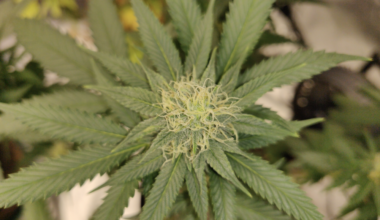Former Texas Gov. Rick Perry (R) recently joined leading psychedelics researchers and advocates for an event focused on promoting research into the therapeutic potential of substances like psilocybin and MDMA for military veterans.
Perry—who took some by surprise after advocating for a Texas bill to require studies into the medical use of psychedelics for veterans earlier this year—spoke at the Strength In Numbers gala that was hosted earlier this month by Veterans Exploring Treatment Solutions (VETS).
“If you would have told me five years ago that Rick Perry, knuckle-dragging, right wing Republican governor of Texas, was going to be in the same sentence with the word ‘psychedelics,’ I would have bet you the farm, baby,” the former governor said.
But it was experiences like one where he met a young military veteran with post-traumatic stress disorder who struggled to find adequate health care through VA that has moved him to look beyond the government for assistance.
After seeing what it took to get that individual the health care he needed, it “became abundantly clear to me that our government did a piss-poor job of taking care of veterans—that they didn’t understand how to help these young people,” he said.
Perry was joined at the recent event by Multidisciplinary Association for Psychedelics Studies (MAPS) founder Rick Doblin, as well as author and philanthropist Tim Ferriss.
It was an honor to be on stage in Coronado with Governor Rick Perry (@GovernorPerry) and Rick Doblin (@RickDoblin) to discuss psychedelic therapies and goals for the next several years.
Learn more about VETS at https://t.co/VT66KgrcNM.
(2/3)
— Tim Ferriss (@tferriss) November 15, 2021
Perry, who also served as energy secretary during the Trump administration, talked about what it’s going to take to get the government to seriously consider the potential therapeutic use of psychedelics for vulnerable communities, arguing that the fight should be taken directly to the U.S. Department of Veterans Affairs (VA).
“If we’re going to win this battle—if we’re going to get the federal government to basically say it’s okay to have these compounds available for the treatment of post-traumatic stress, traumatic brain injury, the anxiety, the depression, those things that that we know occur out there—we’re going to have to have pressure on the VA,” he said.
We’re honored to have former Texas governor and U.S. Secretary of Energy Rick Perry as a speaker at our Strength in Numbers Gala to End Veteran Suicide. Join us on Veteran’s Day, November 11, at the world-famous Hotel Del Coronado in California. https://t.co/qJQt7JkLmR. pic.twitter.com/Pmrf9YhFlW
— Veterans Exploring Treatment Solutions (VETS) (@vetsforvets) November 2, 2021
“You’re going to have to have a United States congressman sitting in a committee grilling the VA chair, the VA head, the secretary of the VA, the bureaucrats that work there with the secretary of defense, understanding [that] we’ve got to have this done,” Perry said.
Rep. Colin Allred (D-TX) is an example of a congressman who did just that at a meeting before the House Veterans’ Affairs Committee in September, when he asked for a status update on research into the use of psychedelics for the treatment of PTSD among veterans.
An official with VA said the department is “very closely” following such research and “we do have researchers that are connected to the VA that are working on some of these projects with their affiliates.”
At this month’s psychedelic panel, Perry also stressed that “being politically active is really important. And I know that may be really unsavory to some of you to have to go get into that mud pit—and it can be, but it’s worth it for these people’s lives.”
“We’ve got to stay really focused on this and win this battle, if you will. And this battle being to allow for veterans to be served in their effort to find their way through these mental illnesses that they’re facing, and that these compounds are the answer to that. I am very much against the legalization of drugs because I don’t want to get a parallel battle going on that we don’t need to be fighting at this particular point in time.”
…
“I think it’s really important for us to win this battle that we’re in right now. We can’t win the war if we don’t win this battle first. So I think it’s really important for us to make sure that our efforts stay as laser focused as we can.”
Perry went on to say that he understands that there’s “a little bit of uneasiness maybe about the capitalization of this industry, if you will—and I hope I don’t offend anybody by calling it an industry—but the point is, I don’t think you can grow this into the the expansive treatment infrastructure that you need without capitalism being involved in there somewhere.”
Our #StrengthInNumbers Gala to End Veteran Suicide was a success!
Head over to the Veterans Exploring Treatment Solutions (VETS) Facebook page to view photo albums with images from the event:https://t.co/vsfKZvd59J @RickDoblin @tferriss @GovernorPerry pic.twitter.com/irKggdBP4j
— Veterans Exploring Treatment Solutions (VETS) (@vetsforvets) November 18, 2021
“I think it’s important that there are companies that invest in this, that there are therapists that get trained, and that’s going to take time and money,” he said. “But to have the infrastructure in place, may be one of the most important things that we do, to…win the war, if you will, of destigmatizing and taking the taboo away.”
Doblin’s organization, MAPS, has been at the forefront of psychedelics research, including by leading Food and Drug Administration-approved clinical trials into MDMA in the treatment of post-traumatic stress disorder.
Ferriss, meanwhile, has been helping to fund various psychedelics research initiatives throughout the country. For example, he’s providing funding through his Saisei Foundation to support a first-of-its-kind psychedelics policy center at Harvard Law School.
Photo elements courtesy of carlosemmaskype and Apollo.
Medical Disclaimer:
The information provided in these blog posts is intended for general informational and educational purposes only. It is not a substitute for professional medical advice, diagnosis, or treatment. Always seek the advice of your physician or other qualified healthcare provider with any questions you may have regarding a medical condition. The use of any information provided in these blog posts is solely at your own risk. The authors and the website do not recommend or endorse any specific products, treatments, or procedures mentioned. Reliance on any information in these blog posts is solely at your own discretion.







